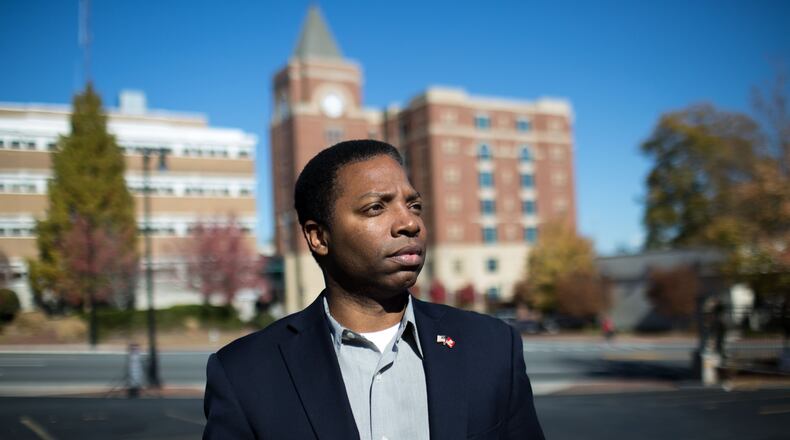Riding the momentum of Hillary Clinton’s Cobb County win, local Democrats say they are poised to solidify gains and reach out to moderates and independents who may be turned off by President-elect Donald Trump.
Clinton lost the election, but she won the traditionally conservative Atlanta suburb with 51 percent of the vote to Trump's 48 percent. Statewide, Trump won Georgia by five points, a smaller margin than his Republican predecessors.
Michael Owens, who was elected as the new chair of the Cobb Democratic Party following the election, tempered the victory, saying “I haven’t used the phrase ‘Cobb’s turned blue.’”
But, he said, “We’ve proven now that we can win races county-wide. … We still have a lot of work to do.”
Much of the post-election analysis has been centered on a class and educational rift that saw rural Democratic strongholds swing for Trump. But that doesn't explain the results in Cobb County.
“The journalist narrative of this election was about the resurgence of the working class white voter, or the rural voter, so that’s not your East Cobb type of upper middle class, well educated voter,” said Andra Gillespie, an associate professor of political science at Emory University.
Those are the voters Owens thinks his party can bring on board, especially, he said, if Trump continues to double down on his divisive rhetoric toward minorities and women, or fails to deliver on his promises. Owens, a cyber security consultant and Marine Corps veteran, said he has been flooded with phone calls from Cobb residents looking to get involved with the Democratic Party.
“That’s what I view as a large part of my role now, is ensuring that those people who want to be engaged have a home to come to,” Owens said.
Many Republicans dismissed Clinton’s victory in Cobb as a one-off resulting from Trump’s uniquely polarizing style. Others point to long-term demographic shifts bringing minorities and transplants from other states that favor the left.
Republican strategist Brian Robinson, who recently worked on Cobb Chairman Tim Lee's unsuccessful reelection bid, said regardless of the election results, the party urgently needs to diversity if it is to remain competitive on a local, state and national level going into the future. Whether Trump helps or hurts that effort depends heavily on whether he can create jobs for Americans of all backgrounds, Robinson said.
But Robinson said that Trump’s economic populism — if it sticks — could hurt the party among what he calls the “Rubio counties”—the counties that voted for Florida Senator Marco Rubio in the primaries and never really got behind Trump and his aggressive anti-free trade agenda.
“We don’t know yet on many issues if Donald Trump is going to do what he actually said he was going to do,” Robinson said, adding that many Republicans were taking a “wait and see” approach.
“Over an arc of time, if he sticks with protectionist policies, which are bad for our business communities, and ergo bad for the college-educated voters who work in the business community in executive and managerial roles, those folks are going to start looking for another place to lay their head,” Robinson said.
DeBose Porter, chair of the Georgia Democratic Party, described the electoral shift in Cobb as a sea change.
“Cobb County has always been a bellwether county,” he said.
Porter argues that it wasn’t just demographics fueling this change, but a realization among voters that Democratic policies are better for their quality of life.
“The kinds of things people want for their communities — quality healthcare, transportation, education, job training, the amenities of clean air and water — are issues identified because Democrats have stood up for them,” Porter said.
But Gillespie, the Emory professor, said the Democrats need to craft a national message that appeals to working class whites while preserving the minority coalition they have built.
“Building a big tent coalition is actually delicate work, and it’s delicate work in an era of polarization,” Gillespie warned.
Neither Republicans nor Democrats, she concluded, should take partisan support for granted.
“I think that both party establishments have relied very heavily on ‘Trust me, I know what I’m doing,’ and I think the lesson of this election is: People don’t trust either party,” Gillespie said.
Elizabeth Snow-Murphy is among the newly energized Democratic voters who found herself knocking on doors for Clinton after Trump became the Republican nominee.
“The prospect of living in a world with Donald Trump (as president) was something that I just wanted to say that I did everything I could to stop it,” she said. “It was … an outlet for my own anxiety.”
Snow-Murphy, an Arkansas native who moved to East Cobb with her husband and children last year, said once she got involved, she was shocked to see how many like-minded people lived in Cobb.
The party is now concentrating its efforts on the 2018 governor’s race, and Snow-Murphy thinks the Democrats could take Cobb again.
“I think that turning Cobb blue was huge,” Snow-Murphy said. “I think it spoke to our strengths; I think that there’s room to grow; I think that, especially right now where people are really angry and feel sad, using that emotion and channeling it into something productive is what we have to do, and I do feel like the leadership is starting to recognize that and have starting putting people in place who want to move the needle.”
About the Author
Keep Reading
The Latest
Featured




